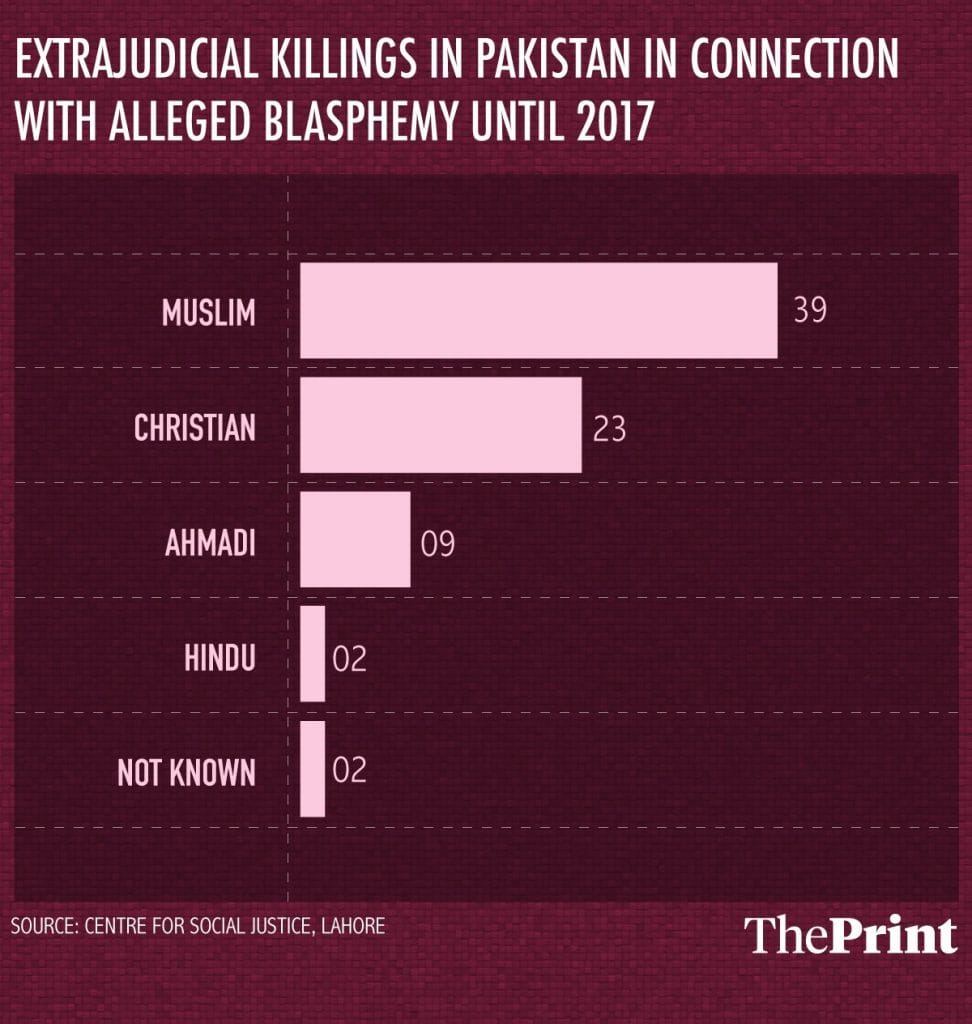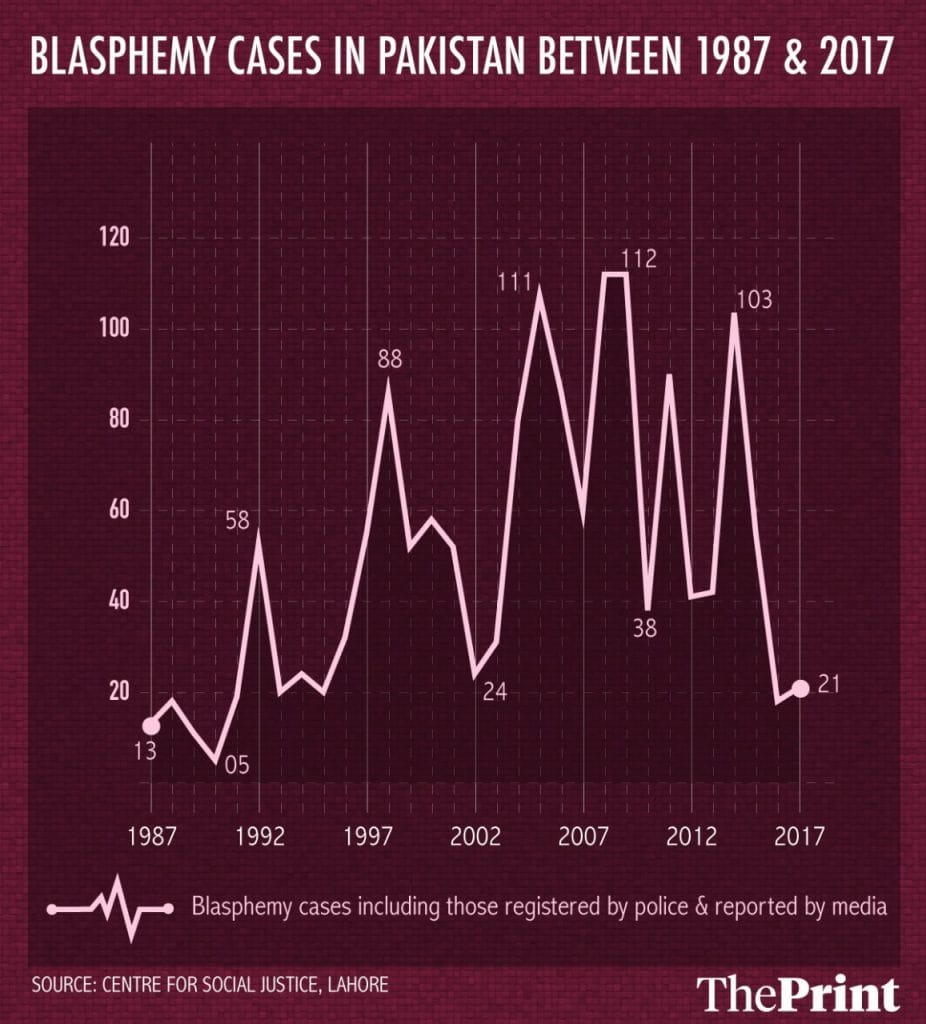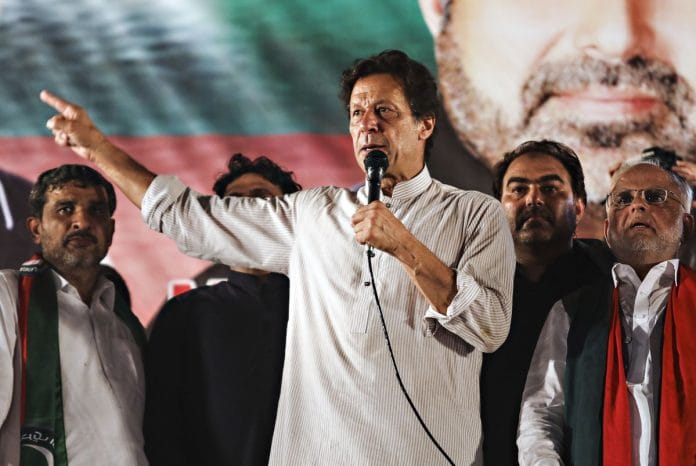Prime Minister Imran Khan is being accused by Pakistani religious groups of allegedly blaspheming against the Prophet’s companions – “by questioning their bravery in the Battle of Badr” in a post-budget speech. One can question Imran Khan’s limited historical knowledge and flawed oration on such subjects. But for the opposition – the Pakistan Muslim League-Nawaz and the Pakistan Peoples Party – to ride the blasphemy bandwagon for short-term political gains is nothing but reckless.
The government in Pakistan uses blasphemy to silent dissenters, the politicians use it for petty politics, the religious mafia uses it to uphold their hegemony, and the common people use it to settle personal vendettas against persecuted religious minorities. Everyone is an equal opportunity profiteer.
Imran Khan and PTI’s hypocrisy
For decades, the issue of blasphemy has been used in Pakistan to garner votes, pander to the religious lobby, and fan hate in an already divisive society.
The general elections of 2018 were a testimony to that.
At the time, political parties, including the Pakistan Tehreek-e-Insaf, rallied around firebrand cleric Khadim Hussain Rizvi, who accused the PML-N government of committing blasphemy by changing the words – from ‘I solemnly swear’ to ‘I believe’ in election oath that a candidate is supposed to take. Although the change was hastily rolled back, then law minister Zahid Hamid was forced to give in to the resignation demands of the Islamists, thereby ending the three-week protests and violent clashes that claimed lives of at least six people.
Throughout his 2018 election campaign, Imran Khan used the issue of the finality of the Prophet to establish that the incumbent Nawaz Sharif government had blasphemed. Khan and his political allies not only defended the blasphemy laws but also used derogatory language for the Ahmadiyya community.
Also read: Pak minister criticises Dutch contest on Prophet, mum on blasphemy at home
Focus on West
Notwithstanding the consequences of such rhetoric introduced under the British rule, the blasphemy laws originally carried a maximum sentence of two years in prison. In the mid-1980s, then military dictator General Zia-ul-Haq on the road to Islamisation added stricter punishments for a wide array of violations, including the desecration of the Quran, under Sections 295-B and 295-C in the Pakistan Penal Code. These became the means to persecute people in the name of religion, with religious minorities being the worst hit.
Hundreds of other people have been convicted under 298-A (use of derogatory remarks), 298-B (misuse of epithet, descriptions and titles), and 298-C (calling himself a Muslim or preaching or propagating his faith), that mostly target the Ahmadis.

Unable to address the issues of blasphemy at home, Pakistani leaders want the West to be more vigilant on blasphemy against Islam. There is a sense that Pakistan’s internal blasphemy laws should be followed by the rest of the world.
Addressing the 14th Summit of the Organisation of Islamic Cooperation (OIC) in Makkah, Prime Minister Imran Khan said the blasphemous acts against Prophet Mohammad in the Western world was the failure of the OIC for not being able to explain to them the love and affection the Muslims have for the Holy Prophet.
“I would like to say from this platform that in the forums like the United Nations and the forums like the European Union, we must explain to them that they cannot hurt the sentiments of 1.3 billion people under the garb of freedom of expression,” said Khan.
Also read: Pakistan blogger known for criticising army hacked to death in Islamabad
Similarly, in 2012, then President Asif Ali Zardari in his speech at the UN General Assembly spoke of his support for an international blasphemy law in reference to the controversial film ‘Innocence of Muslims (2012)’. “The International community must not become silent observers and should criminalise such acts that destroy the peace of the world and endanger world security by misusing freedom of expression,” Zardari said. Then Prime Minister Raja Pervez Ashraf too vowed that his government will not remain silent until an international law against blasphemy was framed.
Most of the international blasphemy rhetoric by Pakistan’s civilian leaders is aimed more towards their own countrymen than the West. But still, what legitimacy does Pakistan have to push the world for stricter blasphemy laws, while it fails to stop the misuse of the law at home?

The blasphemous targeting
More than 1,500 people were charged under Pakistan’s blasphemy laws between 1987 and 2017, while 75 were extra-judicially killed during the same time on accusations of blasphemy, according to the Center for Social Justice, a Lahore-based rights and advocacy group.
No one has been executed for blasphemy, with currently 40 people either on death row or serving life sentences. This includes Shugafta and Shafqat, a Christian couple accused of sending an allegedly blasphemous text message and sentenced to death in 2014; Sawan Maish on death row since 2014 for allegedly using derogatory remarks against the Prophet.
Then there are those who have been languishing in jail for years, awaiting trial: Professor Junaid Hafeez booked under 295-C for posting allegedly sacrilegious comments on Facebook, which he denies; Nabeel Masih in prison for liking an allegedly derogatory image of Kabba on Facebook; brothers Patras and Sajid Masih booked for forwarding alleged blasphemous text messages.
Also read: Pakistan’s new ISI chief was accused of secretly helping Imran Khan’s party in 2018 polls
Last month, a Hindu Pakistani veterinarian was charged with blasphemy in Mirpur Khas district in Sindh. Dr Ramesh Kumar was charged with blasphemy after a cleric said he had delivered medicine wrapped in pages of the Quran. Riots broke out in the area as protesters burned shops belonging to Hindus.
The argument of repealing the blasphemy law hasn’t gone anywhere. No government has the guts to get the law amended, let alone repeal it. The key bill seeking stricter punishments for false blasphemy accusations was withdrawn from Senate by the ruling PTI. Religious affairs minister Noor-ul-Haq Qadri reiterated that the Imran Khan government was determined to restore the bill to the “original soul” of section 295-C.
After Asia Bibi’s exoneration from blasphemy charges and her leaving the country shed light on Pakistan’s discriminatory laws and its justice system, shouldn’t Pakistani leaders’ first priority be to address the concerns arising out of the law at home instead of lecturing the West on what it should do to stop blasphemy?
The author is a freelance journalist from Pakistan. Her Twitter handle is @nailainayat. Views are personal.







I feel happy that Pakistan is and would be caught up in its religious fundamentalism. Although India seems to be slowly moving in the same direction but surely still way far from Pakistan. The fundamentalist way of thinking is keeping the majority in Pakistan illiterate and reluctant towards scientific aptitude. This would affect the long term technological and economic growth in Pakistan. Good for us I guess.
Ankit: Perhaps an impoverished Pakistan is NOT good for us. What’s good for us is to settle matters with Pakistan’s ISI to an extent that animosity doesn’t spill into a dangerous zone. Chaos helps the terrorists’ agenda, and in our region, terrorism is likely to affect all of us if Pakistan is weak and fumbling. And ISI will also not be spared (unless you treat ISI as a terrorist organisation masquerading as a legitimate intelligence agency). A Syria or Yemen like situation on India-Pak-Afghan borders helps neither India nor Pakistan. However, it is important for India to maintain the ongoing pressure but equally important to keep reviewing its Pak strategy at regular intervals, but at the same time, NOT let Pakistan score points in the international community at our expense.
This is a Myth. Israel never allowed Palestine to get stronger there by securing there country. Pakistan must be doomed.